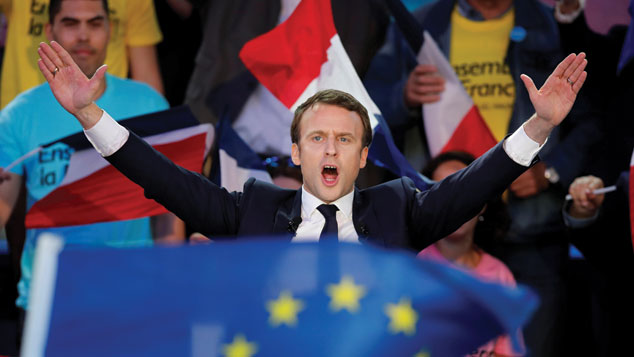
The French presidential election “turned out to be a buy-the-first-round, sell-the-second-round affair”, as London Capital Group’s Jasper Lawler told the Financial Times. The euro slipped from a six-month high as Emmanuel Macron’s decisive victory over the far-right’s Marine Le Pen became clear. The win had been priced in. With the populist threat of referendums on the euro or EU membership in several countries contained for now, markets are expecting peace and quiet on the political front – at least until 2018, when Italy’s elections are due – and hoping that Macron will be able to liberalise the French economy as he has promised.
It is also “conceivable”, says The Times, that Macron and Germany’s chancellor Angela Merkel, if re-elected in September, could devise a common approach to fiscal integration, which would repair the key flaw in the single European currency. Macron is one of the few policymakers who has admitted that the single currency will eventually collapse if its structure is not fixed.
For now, Macron will get the benefit of the doubt. As we pointed out last month, he is one of the very few people who have actually been able to push structural reforms though parliament before, and his centrist movement appears to be on course to become the largest party in parliament in legislative elections next month. Getting Germany to agree to euro reforms will be a big challenge, however, and investors should not dismiss the possibility of a populist upset in Italy. If Italy leaves the eurozone, the project is finished.
Still, the mood in European equity markets is likely to be positive for the next few months, not least because the fundamentals are improving rapidly. “After an arduous winter, a green and leafy economic spring has arrived,” says the FT. Last year the eurozone grew by 1.7%, a tad faster than the US, and the first quarter alone saw growth of 0.5%. Activity surveys are at six-year highs.
Of the major regions, Europe is the most exposed to world trade, and the gradual increase in global economic momentum constitutes an additional fillip. So after years of disappointment, earnings growth and upward earnings estimates are both outpacing America’s. Valuations are also far more reasonable. Indeed, price-to-book ratios are still “around long-term troughs compared to markets like the US”, according to Matthew Siddle of Fidelity European funds on Citywire.co.uk. With the backdrop brighter than it has been for years, plenty of global investors, who have hitherto been relatively cautious about the continent, are likely to allocate more money to it in the weeks ahead.